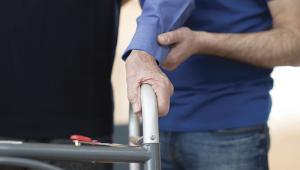Teamwork and innovation helped social care staff reduce the time people were waiting to be released from hospital, the Association for Directors in Adult Social Services said this week.
But Margaret Willcox, president of ADASS, said: “Whilst we celebrate the efforts of our staff to reduce winter pressures on social care, ultimately, with a £2bn on shortfall in funding facing our sector, only a long-term, sustainable funding plan can enable us to provide the person-centred approach to social care we badly need.”
She called on the government to set out such a plan in the upcoming green paper on social care, which is expected to be released in the summer this year.
ADASS conducted a survey and amongst the 20 social services departments that responded there had been reductions or the complete eradication of delayed transfers [releasing people from hospital].
Examples of good practice ADASS highlighted from the survey included:
- Derby: recorded zero delayed transfers in a period where an immediate care service was closed twice in three weeks. This was due to the successful implementation of an escalation strategy which eased pressure from a local acute hospital.
- Buckinghamshire: a ‘Resilience Group’ of care workers with 4x4s overcame heavy snow to retrieve a lonely dementia patient whose husband had been admitted to hospital in an emergency. Despite the adverse conditions, a local support worker took care of the lady while her husband was cared for.
- Peterborough: sought to reduce delayed transfers by introducing a “front door” to council services. Early help in services such as occupational therapist support, assistive technology and benefits advice reduced the amount of social care assessments done by 70%.
This winter has been described by some NHS staff as the “worst they remember”, with hospital bed occupancy hitting 95% in December last year and NHS England delaying non-urgent operations at the start of this month to cope with an unusually huge demand for health services.
Niall Dickson, chief executive of the NHS Confederation, which represents organisations across the healthcare sector, told PF: “Our members are consistently telling us that this is the worst winter they have experienced in their careers.”











